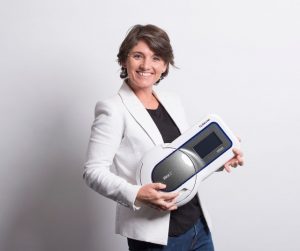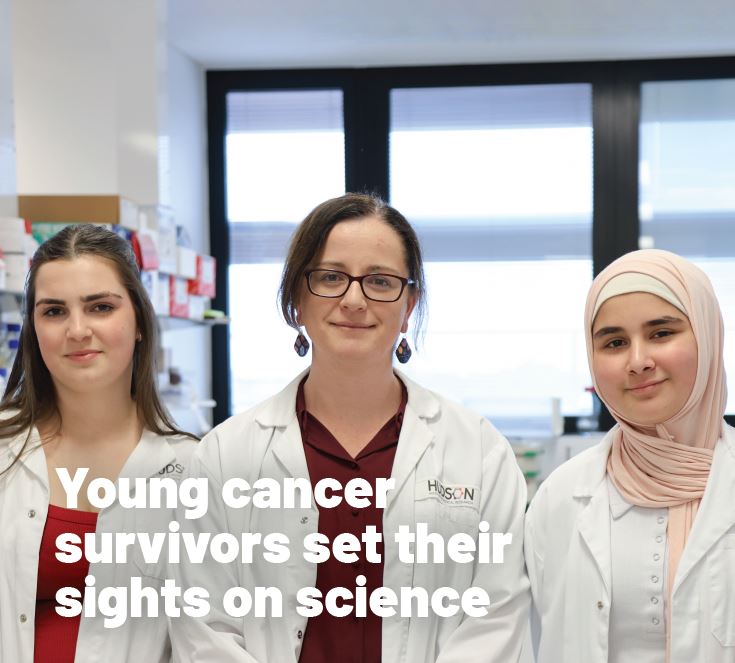A world of opportunity for LGBTQIA+ community in STEMM
By Hudson Institute communications
Melbourne is hosting the first Australian symposium for LGBT STEMM Day on 5 July. Dr Jaclyn Pearson is one of a number of Hudson Institute researchers who are attending and also has the honour of being an event speaker.
In this Q&A, Dr Pearson shares key highlights about her career and details her experience being a gay woman in science.

What was your journey to becoming a scientist?
I chose science at university because I loved the idea of chemistry, biology, the world of Mary Shelley’s Frankenstein, and forensic science – all that cool stuff that makes you want to read more books and get your hands dirty doing exciting experiments.
I undertook a science degree at the University of Western Australia and once I started microbiology, I was hooked. I absolutely loved it. I was fascinated by the idea that such tiny microbes could have a huge impact on the world.
Before beginning your career in science, you enjoyed a number of successes as part of the alternative/punk rock band Lash. When did you decide you wanted to commit to science?
I really enjoyed my time with the band but after a few years of constant touring and living together, it became a bit of a strain and I began to long for something more intellectually stimulating to do.
It was a choice between going back and studying music or continuing my science degree. I chose the science because I wanted to achieve great things and make a difference in the community. I was really excited about the idea of getting a PhD! I was the first in my family to do so.
Do you have a turning point or defining moment in your research career?
The most defining moment in my career was moving to Melbourne from Western Australia and taking up a PhD with Professor Elizabeth Hartland at the University of Melbourne. It was a professional and fast paced work environment and always heaps of fun, with great people around me.
At the time, I think I really needed a strong female mentor and Prof Hartland was fantastic, she had such a focused vision and her leadership was always directed and strong. I felt very fortunate to have had the opportunity to work with Prof Hartland, it was always a team effort that produced outstanding scientific achievements. I had an excellent project that was very fruitful as far as publications and award opportunities go, and I just thrived. That’s where I really cemented my passion for scientific research.
What excites you about your research?
Discoveries! The fact that you can make a discovery every day and eventually your discoveries all add up to something that has a real impact on scientific research and progress. That is extremely satisfying.
What is you experience of being a gay woman in science?
To be honest, being gay does not really impact my science, unlike being a woman does. We are all aware of the challenges of being a woman in any competitive field of work, but my sexuality is just me – it’s who I am. I’m accepted and never judged by my work colleagues and this gives me confidence in my scientific career.
Who were your role models in your early career?
In my early career my role models were mostly academics at university. I always thought they were the fount of all knowledge. I saw them and wanted to stand at the front of a lecture theatre, talking about something I knew ‘everything’ about.
I had a particular role model who was a postdoctoral fellow in another lab, Dr Lea-Ann Kirkham. She arrived from Scotland with fresh ideas and was very bold as a woman in science for the time in 2006.
She was the one who told me to take a chance and move to a bigger city, to a top university, to a top lab and make it happen. I took her advice and have been forever grateful.
Is it a challenge to balance a successful career in science with family life?
It can be tricky to balance a science career with family, especially if you expect yourself to be very successful. Having a successful career in science takes constant commitment to your work and never letting up – not at night, not in the early mornings and working on weekends and often holidays too.
However, family is the thing that makes me most happy and keeps me going so I always make time for my loved ones and make the most of holidays!
What did you hope to achieve as a speaker at the symposium?
I wanted to show some of the younger scientists who may identify as being LGBTQIA+ that it is totally normal. It’s okay to be just the person you want to be – the person you were meant to be – and that this won’t be a barrier to having a successful career in science.
It is so important to feel happy in yourself, this is always the key to success.
Do you have any reservations about being open about your sexuality?
Most of the time I don’t have any reservations. There are times when I do feel a little nervous and threatened, but that is why I chose to live in a big and diverse major city. It is a safe space to be in and I feel very comfortable in it.
There are many times when people ask me about my ‘husband’. This can be awkward, but as the years get on, I am more confident about stopping them politely and saying, ‘Actually I have a wife’. It is very empowering and reminds me again that it’s okay to be myself.
 LGBT STEMM Day
LGBT STEMM Day
In support of LGBT STEMM Day, the Hudson institute logo has gone rainbow to show our support for diversity and recognise the importance of improving visibility for the LGBTQIA+ STEM community.
The LGBT STEMM Day Symposium was organised by Victorian-based initiative QueersInScience to showcase and celebrate the outstanding achievements of Australian LGBTQIA+ researchers, and promote awareness and understanding of the issues faced by LGBTQIA+ people in this sector and ways to solve them.
Contact us
Hudson Institute communications
t: + 61 3 8572 2697
e: communications@hudson.org.au
In this article
- What was your journey to becoming a scientist?
- Before beginning your career in science, you enjoyed a number of successes as part of the alternative/punk rock band Lash. When did you decide you wanted to commit to science?
- Do you have a turning point or defining moment in your research career?
- What excites you about your research?
- What is you experience of being a gay woman in science?
- Who were your role models in your early career?
- Is it a challenge to balance a successful career in science with family life?
- What did you hope to achieve as a speaker at the symposium?
- Do you have any reservations about being open about your sexuality?
- LGBT STEMM Day
About Hudson Institute
Hudson Institute’ s research programs deliver in three areas of medical need – inflammation, cancer, women’s and newborn health. More
Hudson News
Get the inside view on discoveries and patient stories
“Thank you Hudson Institute researchers. Your work brings such hope to all women with ovarian cancer knowing that potentially women in the future won't have to go through what we have!”


